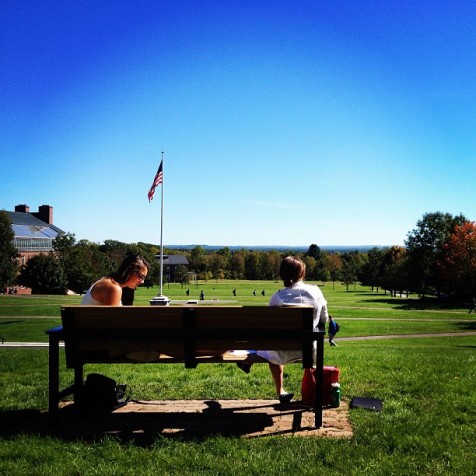He first discusses Pritchett's approach to education as a means of enforcing social norms, values and behaviors for its citizens. To me (as a daughter of an educator), this sounded wacko. But I think Pritchett explains it best in this Cambridge Nights interview. Right around minute 5:20.
As nation states strove to legitimate the rule... one of the ways [they did this] was through control of the socialization of the youth. Governments said: "Ok, kids are going to get educated, if we don't control the education, who knows what they're gonna learn vis-a-vis affiliation of the nation state, affiliation to particular ideologies. So it was really the ideology of affiliation of nation states combined with parental demand around their children's economic futures that led to more schooling and that schooling being controlled by the state.
This perspective doesn't solve the problem that Massive Open Online Courses might leave me unemployed in the future, but its something to keep in mind when we talk about education policy.
Meanwhile, my parents, in concern for their daughters possible future unemployment (economists read: parental demand around their children's economic future), brought a New Yorker Magazine all the way to Tanzania. In the May issue was an elaborate, New Yorker style, ten-page article about MOOCs. Good thing they haven't seen this visual about my low prospects on the job market (until now: hi M&D!).
Bellemare discusses the social capital students earn in college, learning to work together with young people from various backgrounds, especially in American college students where students tend to live on campus all together. While I completely agree with this assessment of social benefits, I'm skewed with privilege because I attended a small liberal arts college that prided itself with academic community, cultural diversity and intimate brochure-photo gatherings over a shared text book on the pristine lawn. But, according to the New Yorker, my experience is not the reality:
When people refer to “higher education” in this country, they are talking about two systems. One is élite. It’s made up of selective schools that people can apply to—schools like Harvard, and also like U.C. Santa Cruz, Northeastern, Penn State, and Kenyon. All these institutions turn most applicants away, and all pursue a common, if vague, notion of what universities are meant to strive for. When colleges appear in movies, they are verdant, tree-draped quadrangles set amid Georgian or Gothic (or Georgian-Gothic) buildings. When brochures from these schools arrive in the mail, they often look the same. Chances are, you’ll find a Byronic young man reading “Cartesian Meditations” on a bench beneath an elm tree, or perhaps his romantic cousin, the New England boy of fall, a tousle-haired chap with a knapsack slung back on one shoulder.... Universities are special places, we believe: gardens where chosen people escape their normal lives to cultivate the Life of the Mind. But that is not the kind of higher education most Americans know. The vast majority of people who get education beyond high school do so at community colleges and other regional and nonselective schools. Most who apply are accepted. The teachers there, not all of whom have doctorates or get research support, may seem restless and harried. Students may, too. Some attend school part time, juggling their academic work with family or full-time jobs, and so the dropout rate, and time-to-degree, runs higher than at élite institutions. Many campuses are funded on fumes, or are on thin ice with accreditation boards; there are few quadrangles involved. The coursework often prepares students for specific professions or required skills.... This is the populist arm of higher education. It accounts for about eighty per cent of colleges in the United States.
For these students, at the eighty percent of colleges in the states, higher education is about simple cost-benefit analysis. It's about finding short-term child care and rounding up enough cash so you can finish that certificate in dental assistance or officially learn to operate the infrared spectrometer.
From a (hopefully) future faculty perspective, the impending imposition of MOOCs is ominous. I can only hope that I will be lucky enough to become employed at an institution like Amherst, where the faculty voted against joining a MOOC program, and the administration and endowment were privileged enough to support that decision.
Hat tips: Mom and Dad.

 RSS Feed
RSS Feed